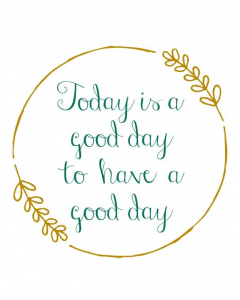
Do you think more about what is going well or what isn’t? Do you end your day thinking about what you accomplished or what you didn’t? Do you reflect on how fortunate you are or how frustrated you are? Some people require almost perfect circumstances in their life to be satisfied and happy. If they have any problems, conflicts, or adversity, they are not happy. They end their day feeling uneasy if not stressed and frustrated.
In contrast, some people are content and happy regardless of the problems they encounter. They don’t dwell on what didn’t go well or the mistakes they made. Instead, they think about what went well or how they will do something better next time. They think about what they are grateful for. Despite adverse circumstances, they find joy in simple pleasures such as having family, spending time with friends, or helping others.
Most people reading this article don’t worry about obtaining food, having shelter, or living out of harm’s way. This means you probably live in circumstances that most people in the world would be extremely grateful to have. In other words, most people living as you do would consider every day to be a very good day.
Have you ever thought about what it takes for a day to be a good day for you? Or a great day? In developed countries such as ours, some people consider a good day to be earning a good wage, getting everything done on their to-do list, or accomplishing a goal. For others it is receiving affirmation, feeling loved, or being healthy. Or not having any problems or any new problems. Or creating or completing something.
If you regularly end your day feeling you had a great day, congratulations. You are probably a happy person. You enjoy life. But many people don’t. Especially in our contemporary society filled with so much unrest and uncertainty, many people end their day feeling unfulfilled, upset, or stressed out. They end their day feeling unsettled.
The reasons not to have a good day are many. There are difficult circumstances and people to deal with. There is too much to do. There isn’t enough time, money, or energy. Things wear out and malfunction. And then there is us. We wear out. We expect too much. We question ourselves. We say and do things that cause conflict.
Despite the plethora of opportunities to get upset and stressed out, how we evaluate our day is a choice. No matter who you are or what happens to you, how you react to others and your circumstances is your choice. How you feel at the end of a day is a decision you get to make. And your decision is based on how you define “a good day”. So, if you’ve never thought about how you define a good day, here is your chance.
Here are two questions to consider:
- Currently, what has to happen for you to feel you had a good day?
- What changes might you make to your definition of a good day to be able to have more good days in the future?
In defining how you assess your day, emphasize criteria in your control. Otherwise, you are outsourcing how you think about your day to the whims of others. If you depend on someone else for how you feel about your day and they are disgruntled, you’ll be disgruntled. Instead, focus on what you did rather than on what others did to or for you. Or what they didn’t do for you. Focus on your accomplishments rather than on how well you met other’s expectations. You own your self-assuredness. You own how you define a good day.
If you agree with focusing on that which is in your control as well as on that which is generally considered “good”, here are a few criteria to consider when assessing your day:
Today, I ….
- spent time with people who I enjoy, I respect, and respect me.
- invested most of my time, energy, and money into that which I’m passionate about.
- accomplished my tasks or something that made progress toward my goals.
- ate, drank, exercised, rested, and did things that were positive for my health.
- did things that left my community, environment, and world a better place.
- was a good steward of my finances and caretaker of the resources in my control.
- showed others empathy and helped them in a positive and meaningful way.
- learned something important that improved my skills, knowledge, or attitude.
- talked through and dealt with a conflict or problem that needed to be addressed.
- built up, encouraged, and treated praiseworthy people with respect.
- managed my desires, fears, biases, temptations, and insecurities.
- maintained an honorable character and faithful core values.
- did the best I could given what I knew and the circumstances I was in.
- didn’t depend on others or circumstances to be grateful and happy.
- enjoyed what I did.
Consider adopting one or more of these criteria in determining what constitutes a good day for you.
Hope you have a good day!
Article by Mike Hawkins, award-winning author of Activating Your Ambition: A Guide to Coaching the Best Out of Yourself and Others (www.ActivatingYourAmbition.com), author of the SCOPE of Leadership six-book series on coaching leaders to lead as coaches (www.ScopeOfLeadership.com), and president of Alpine Link Corp (www.AlpineLink.com), a boutique consulting firm specializing in leadership development and sales performance improvement. For other articles on reaching your peak potential, visit: www.alpinelink.com/blog
